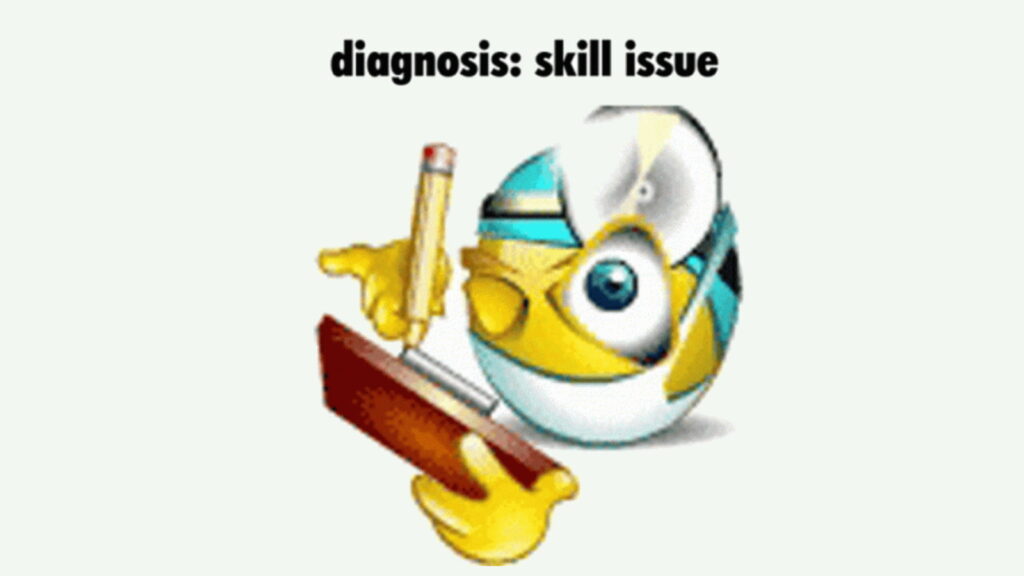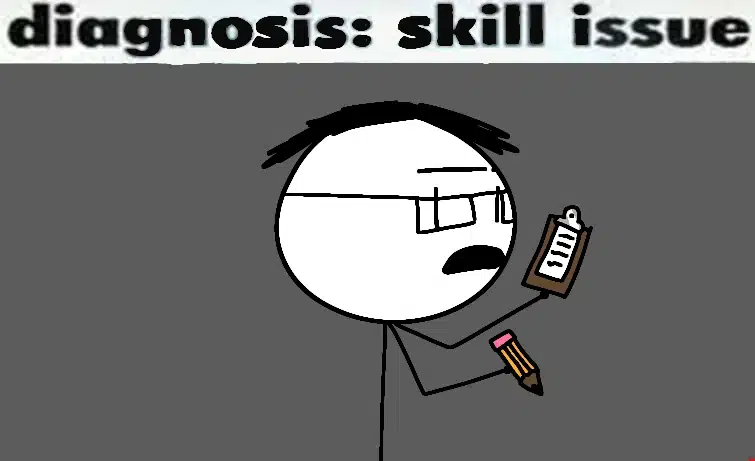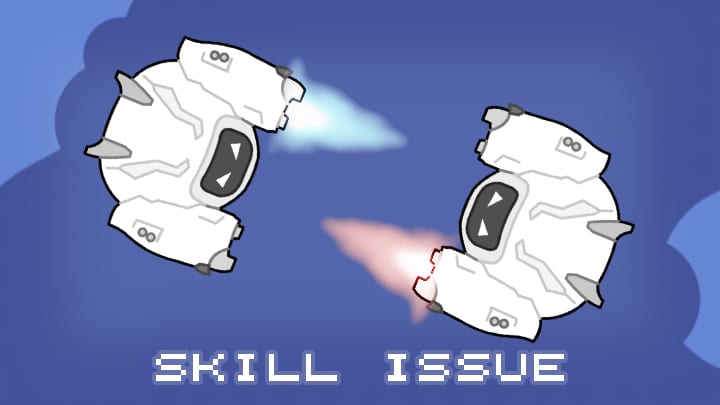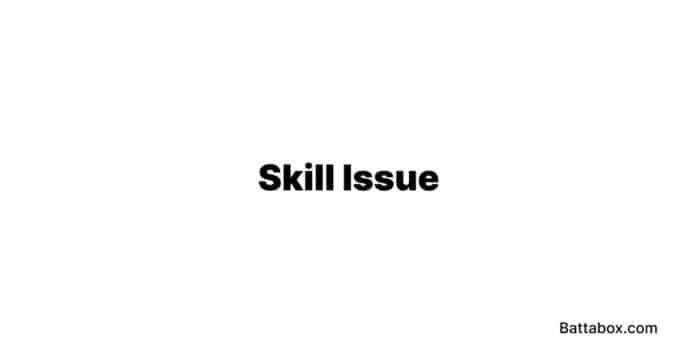Skill issue? Simply put, A Skill issue is a discrepancy between you and your supposed skill expectation.

If that is not simple enough, the Skill Issue represents your inability to pull off certain skill-related problems due to clear under-qualification.
Experiencing some levels of hardship regarding skill in some areas of our life is normal. There are four levels regarding skill mastering.
- Unconscious Incompetence: This is a stage when someone has no idea that they can’t perform a skill and does not see the need to gain it.
- Conscious Incompetence: At this stage, you are fully aware of your inability to perfectly put a skill to the required use.
- Conscious Competence: This means you’ve finally honed the skill and are fully aware of your proficiency at executing related tasks.
- Unconscious Competence: This stage is called Mastery. You tackle problems that your skill can solve with ease. This confidence stems from constant practice.
While that was a quick diversion, Experiencing challenges and difficulties in certain areas that question your ability is called a Skill Issue. You can blame some inefficiencies at work for things like emotional challenges, weak mental health, Family matters and many others.
Skill Issues does not think that. It tells that any difficulty faced at work is due to your lack of skill and competence than other factors. Now, that seems harsh, but Skill Issues just doesn’t care.
There are many forms in which Skill issues can occur. Some of them include; A student facing challenges in understanding a particular subject or an employee finding it hard to perform a task that is clearly stated on his/her curriculum vitae.
There are different types of Skill Issues. Let’s take a look at a few examples.
CHECK: Types Of Employees in Nigerian Workspace
Types of Skill Issues

Just as there are different fields of study, there are also different types of Skill Issues. One might suggest that skill issues can stem from imposter syndrome. ut, Skill Issue negates that. It is focused on theorizing that you are not just good enough.
It’s a pretty myopic point of view, but it is what it is. Here are a few types of Skill Issues you should know.
1. Technical Skill Issues
In fields like programming, engineering or mechanics, it is very easy to have loopholes in one’s skill. You might start out very confident in your skills and yearning for challenges, and one bug or one issue would make you question your competence.
You must soar where others might cower to show yourself approved with assured technical skills.
2. Communication Skill Issues
Contrary to unpopular opinion, communication skills are very important today. Your inability to convey information smoothly and swiftly means there is an issue in your communication skill.
Skill issues in communication can also mean poor public speaking. Excellent communication skills can also mean proficiency in nonverbal cues.
3. Problem-Solving Skill Issues
The ability to analyze complex situations, identify solutions and make a decision is a problem-solving skill. Problem-solving relies on your intuitive habit to see past the colossal size of problems, however big they come.
Not everyone possesses the calmness to spring up with capable solutions to problems.
4. Time Management Skill Issues
Oh, don’t get me started on time management and how important it is. Time is an illusion. I’m not trying to sound philosophical, but, Good time management means you can efficiently organize and prioritize tasks within a particular timeframe.
Procrastination is the word of the day for some of us. We know our skills but lack the time to do it at a particular time.
5. Interpersonal Skill Issues
The present-day workplace prioritizes excellent interpersonal skills. This is because you would mostly be working in a team, and it is important that you can brew positive relationships between workers.
Empathy and conflict resolution are also important traits in good interpersonal skills. Any deviation from this is tantamount to a skill issue.
6. Leadership Skill Issues
Being a leader isn’t about being the best. It’s about making everyone around you better (I just stole that quote from my sister’s WhatsApp status). That doesn’t make it wrong, though. A leader must be able to challenge, guide, motivate and influence others to achieve a common goal.
Not everyone can lead. It is a skill that can be taught. Should you choose to lead, ensure you are ready for such a noble task. If not, Skill Issue knocks loudly.
7. Creativity and Innovation Skill Issues
Creativity and Innovation Skill is very related to problem-solving skills. Innovation is about coming up with new solutions to existing problems. Your solutions might be unexpected and different from the expected.
There are several innovators of this generation, such as; Mark Zuckerberg, Elon Musk and Myself.
8. Critical Thinking Skill Issues
Do you have trouble analyzing information objectively? Can you efficiently evaluate arguments without bias and make sound judgements? These are key questions you need to ask yourself to be sure you do not have skill issues in critical thinking.
It is no surprise that some skill issues are in soft skills. These skills help to create a better work environment and workers in general.
9. Physical Skill Issues
Physical Skill Issues are related to manual dexterity, coordination, and motor skills required for activities like sports, arts, or craftsmanship.
Remember, skill issues can overlap, and a person might simultaneously face challenges in multiple areas. Let’s take a look at how Skill Issues can hinder progress.
SEE: 5 STRONG REASONS WHY VIDEO MARKETING IS IMPORTANT
How Skill Issues Can Hinder Progress

Skill issues can hinder progress in various ways:
1. Inefficiency
Insufficient skills can lead to tasks taking longer than necessary or being completed with lower quality, reducing overall productivity.
2. Frustration
Facing constant challenges due to skill gaps can lead to frustration and demotivation and negatively impact one’s confidence and self-esteem.
3. Missed Opportunities
A lack of skills may prevent individuals from taking advantage of new opportunities, projects, or advancements within their field.
4. Limited Innovation
Without the necessary skills, people might struggle to think creatively or develop innovative solutions to problems.
5. Stagnation
Skill gaps can result in a plateau in personal or professional growth, preventing individuals from advancing in their careers or pursuits.
6. Communication Breakdown
Poor communication skills can lead to misunderstandings, conflicts, and ineffective collaboration with others.
7. Decreased Confidence
Inadequate skills can erode a person’s confidence in their abilities, making them hesitant to take on new challenges or responsibilities.
8. Burnout
Spending more time and effort to accomplish tasks due to skill deficiencies can lead to burnout and stress.
9. Missed Goals
Skill issues may prevent individuals from achieving their goals, whether related to education, career, or personal development.
10. Limited Adaptability
Insufficient skills can make adapting to changes in technology, industry trends, or new ways of doing things challenging.
Addressing skill issues through learning, practice, and seeking guidance can help mitigate these hindrances and pave the way for smoother progress and growth.
SEE: 5 Ways to Improve Your Time Management Skills
How Do You Identify Skill Issues

Identifying skill issues involves self-awareness, observation, feedback from others, and a willingness to reflect on your own abilities. Here’s how you can go about it:
1. Self-Assessment
Reflect on your strengths and weaknesses. Identify tasks or situations where you consistently struggle, experience frustration, or feel uncertain.
2. Performance Discrepancy
Compare your desired outcomes with your actual results. If there’s a significant gap between what you intend to achieve and what you’re accomplishing, it might indicate a skill issue.
3. Feedback from Others
Listen to feedback from colleagues, friends, mentors, or supervisors. They might point out areas where they’ve noticed you are facing challenges.
4. Goal Achievement
Evaluate your progress towards achieving your goals. If you’re consistently falling short, it could be due to lacking specific skills required to succeed.
5. Routine Tasks
Pay attention to routine tasks that take longer than expected or require much effort. This could indicate a need to improve related skills.
6. Comparison to Peers
Compare your performance to that of your peers or industry standards. If you consistently lag behind, it could signal a skill gap.
7. Inability to Adapt
Difficulty in adapting to new technologies, changes in your field, or evolving methods might suggest skill deficiencies.
8. Consistency
Notice patterns of underperformance or difficulties that persist over time and across various situations.
9. Learning Curves
Evaluate how quickly you’re able to learn new concepts or skills. If you find it unusually challenging, there could be a skill issue.
10. Emotional Responses
Be aware of emotional reactions like frustration, anxiety, or avoidance when faced with certain tasks. These emotions might point to skill gaps.
Once you’ve identified potential skill issues, you can take proactive steps to address them. This could involve seeking training, education, mentorship, or practising the specific skills you want to improve.
Remember, addressing skill gaps is a positive step towards personal and professional growth.
SEE: HOW TO BE A TECH BRO
How Do You Overcome Skill Issues?

To overcome skill issues, follow these steps:
1. Identify Specific Skill Gaps
Pinpoint the exact skills you need to improve. Focus on the specific tasks, situations, or areas where you’re facing challenges.
2. Set Clear Goals
Define achievable goals for skill improvement. Make them specific, measurable, achievable, relevant, and time-bound (SMART).
3. Seek Learning Resources
Explore various learning resources such as online courses, books, workshops, or tutorials that are relevant to the skill you want to improve.
4. Practice Regularly
Consistent practice is key to skill development. Engage in hands-on activities, exercises, or projects that allow you to apply and reinforce the skill.
5. Receive Guidance
Seek guidance from mentors, coaches, or experienced individuals who can provide feedback, advice, and support as you work on improving your skills.
6. Learn from Mistakes
Embrace failure as a part of the learning process. Analyze mistakes, understand what went wrong, and use them as opportunities to refine your skills.
7. Use Feedback
Actively seek and accept feedback from others to gain insights into your progress and areas that need improvement.
8. Break Down Complex Skills
Break complex skills into smaller, manageable components. Focus on mastering each component before moving on to the next.
9. Consistent Effort
Dedicate time regularly to practice and improve the skill. Gradual, consistent effort yields better results than sporadic intense practice.
10. Stay Patient
Skill improvement takes time and effort. Be patient with yourself, and acknowledge that progress may not always be linear.
11. Measure Progress
Regularly assess your progress against the goals you set. Adjust your approach if needed and celebrate milestones along the way.
12. Apply in Real-Life Situations
Apply the skill in real-life scenarios to build confidence and practical experience. Practice is essential for translating theoretical knowledge into practical ability.
13. Reflect and Adapt
Periodically reflect on your learning journey. Adjust your approach accordingly to assess what’s working and what isn’t.
14. Stay Open-Minded
Be open to trying new techniques, methods, or approaches. Sometimes a different approach can lead to breakthroughs.
Overcoming skill issues is a gradual process that requires dedication, perseverance, and a growth mindset. Each step you take toward improvement brings you closer to mastering your needed skills.
READ ALSO: Fake Job Listings: How to Protect Yourself from Online Fraud
Conclusion
Skill issue? Simply put, A Skill issue is a discrepancy between you and your supposed skill expectation.
If that is not simple enough, the Skill Issue represents your inability to pull off certain skill-related problems due to clear under-qualification.
Related: Employee Attrition: Meaning, Effects and How to Avoid It
Frequently Asked Questions (FAQs)
1. What Does Get Good Mean?
Get good is a slang phrase that originated in the gaming community. It’s often used as advice or encouragement to someone who is struggling with a particular video game or game-related task. The phrase essentially means that the person should improve their skills and become better at the game to succeed.
2. Where Did It’s A Skill Issue Come From
“It’s a skill issue” is a term commonly used in the gaming community, particularly in online multiplayer games. It’s often employed humorously or sarcastically to explain someone’s failure or lack of success in a game as being due to their lack of skill rather than attributing it to external factors like luck, glitches, or game mechanics.
3. What is an example of a skill issue?
Imagine playing a fast-paced multiplayer shooter game with friends. In one match, you repeatedly get eliminated quickly without being able to secure any kills. Your friends might jokingly say, “Looks like it’s a skill issue!” This means they are playfully attributing your lack of success in the game to your current skill level rather than blaming external factors like lag or bad luck.





